It can be quite a surprise when your regular, egg-laying hen starts laying fewer eggs or suddenly stops. Chickens are expected to lay eggs throughout the year, but there are several reasons why yours may have stopped doing so.
Here are some reasons why your chicken will not lay eggs:
- Your chicken is too young or too old.
- There is an absence of daylight.
- Your chicken is molting.
- Your chicken is exhibiting broody behavior.
- There are environmental stressors.
- Your chicken has dietary deficiencies.
- Your chicken has an infection or a pest infestation.
- Overbreeding of chickens.
This article will explore why chickens stop laying eggs and, if possible, what to do to resolve this.
Reasons Why Your Chicken Won’t Lay Eggs
1. Your Chicken Is Too Young or Too Old
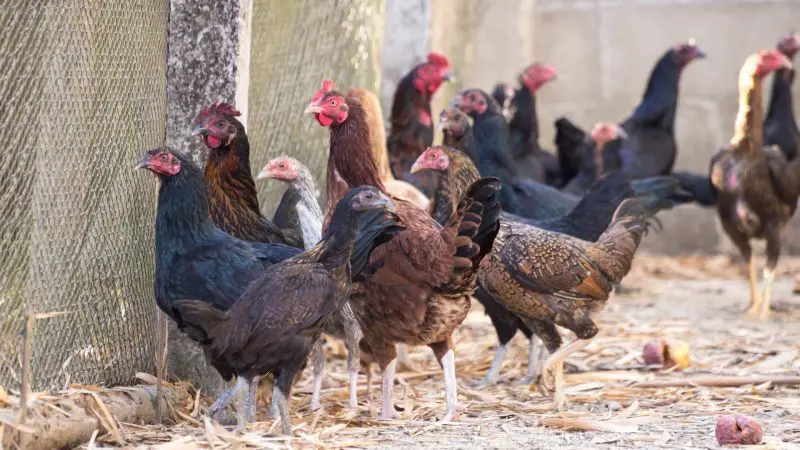
A chicken’s egg-laying years are limited, and hens cannot lay eggs throughout their lifetime.
Most breeds don’t start laying eggs until they are at least six months of age. So if your hen isn’t laying eggs, she may be too young, even if she looks mature enough.
Conversely, the number of eggs laid by a single chicken will reduce as she gets older. Some heritage breeds, like Minorcas and Leghorns, may continue to lay eggs until they’re five years old, while others may stop even sooner.
Your chicken’s ability to lay eggs will depend mainly on her age, and chickens will lay more eggs in their prime.
2. There Is an Absence of Daylight

The number of daylight hours affects a chicken’s reproductive process, and they will reach optimal egg production when they receive at least sixteen hours of daylight. A drop in daylight hours will adversely affect egg-laying due to their hormonal responses.
Winters will especially result in low levels of egg-laying as daylight is limited, so don’t be surprised if your hen’s egg production drops drastically during this time of the year.
However, you can prevent a drop in egg production by creating artificial light sources.
That said, you should be careful when using this option – it may place a significant physiological demand on your bird’s body and should be avoided if possible.
3. Your Chicken Is Molting

When chickens get to the age of eighteen months, they undergo a process called molting, where they shed all their feathers and grow new ones.
Once a chicken starts molting, it undergoes this process once a year, around autumn. Molting usually lasts between eight weeks and sixteen weeks, depending on the breed.
During this phase, a chicken’s energy is directed towards growing new feathers, and she will have fewer biological resources to produce eggs. It’s natural for chickens to take a break from egg production during the molting phase.
To help your chickens molt a little quicker, you can increase the protein content in their diet, as this will help them grow new feathers quickly. However, you want to ensure you switch back to a calcium-rich diet when your chickens are done molting.
4. Your Chicken Is Exhibiting Broody Behavior
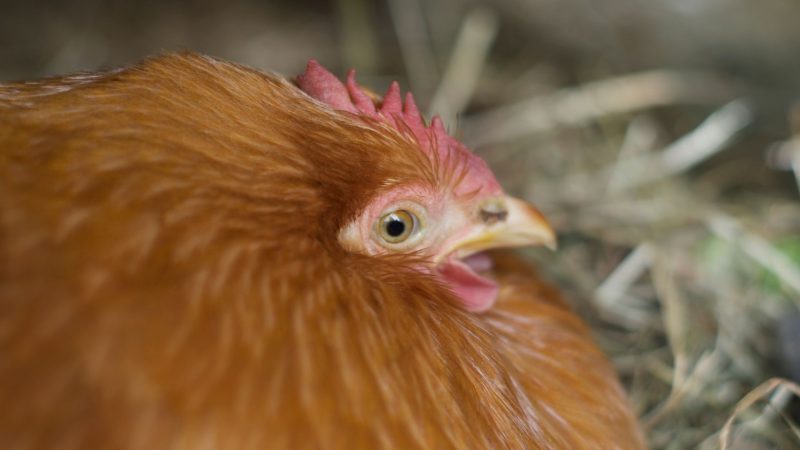
When you’ve got a coop of egg-laying hens, it’s crucial to ensure the eggs are cleared out every day. If you allow your hens to sit on her eggs for two or three days, she will start brooding, and she will be unable to lay eggs.
A broody hen will sit on eggs to keep them warm in hopes of them hatching. Once a hen starts brooding, this hen will cease to lay eggs even if you remove the eggs your hen is brooding over!
Brooding comes with hormonal changes, and your hen can’t break out of this ‘mood’ and start laying eggs again. This means that you’ll have to pay attention when your hen is laying eggs and ensure you remove them so that your hen doesn’t start brooding.
Related: What Is a Broody Chicken? | All You Need to Know!
5. There Are Environmental Stressors
Chickens must feel safe, happy, and healthy to be able to lay eggs consistently. If their environment is stressful or causes them to feel overwhelmed, they may stop laying eggs. Here are a few examples of environmental stressors:
Predator Attacks
You should safeguard your coop against raccoons, possums, foxes, snakes, and other predators that may attack chickens. Not only will it reduce the likelihood of losing chickens, but you can also help your bird lay eggs better.
This is because there’s a chance that your hens will be unable to lay eggs for a few weeks after a predator attack due to the fear response their body is going through.
It’s best to prevent predators from getting near the coop as this will spook your hens, and scared chickens may find it challenging to regulate biological processes, like laying eggs.
Cooped-Up Coops
Your hens can get stressed out when their coops are too tiny for them to coexist comfortably. Without enough space to move, your chickens are likely to get overwhelmed and uncomfortable and may stop laying eggs.
Aside from having enough space to sleep comfortably, hens should be allowed a significant expanse of space outdoors to run around, inspect their surroundings and enjoy the fresh air.
Pecking Order Issues
Another reason why smaller coops are problematic is due to the pecking order among chickens. Hens always exist in a hierarchy, and smaller living spaces mean more fights between dominant group members.
Aggressive chickens also tend to bully the others in the coop when there isn’t enough space, leading to stress and decreased egg production.
Here is a video of another example of a stressor why a chicken stops laying eggs:
6. Your Chicken Has Dietary Deficiencies
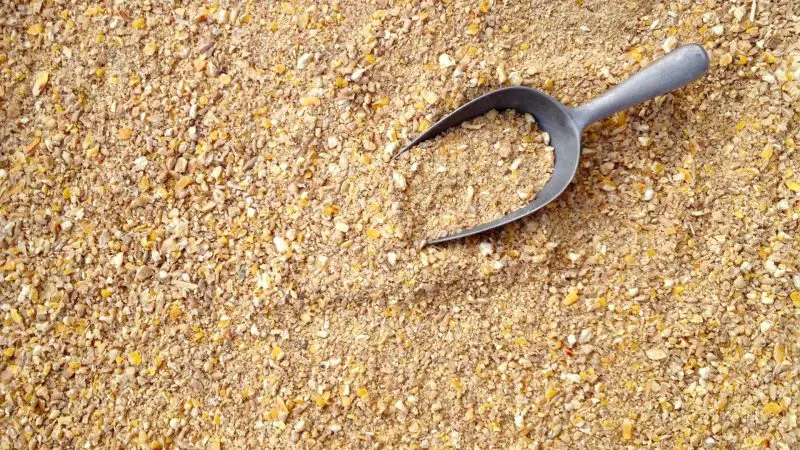
Laying eggs is a resource-intensive process for your chickens and can be extremely taxing on their bodies. The birds require adequate nutrition to supplement the process, as multiple minerals, vitamins, and other nutrients go into making the egg.
Calcium is an essential mineral required for egg production, and chickens need nearly four to five grams (0.14 to 0.18 ounces) of calcium per day to lay healthy eggs regularly.
Aside from ensuring your chickens receive a solid diet, you should avoid feeding them treats and scraps too often. While these tidbits have no adverse effects on chickens, they dilute the nutrition profile, making it harder for their bodies to produce eggs consistently.
7. Your Chicken Has an Infection or a Pest Infestation
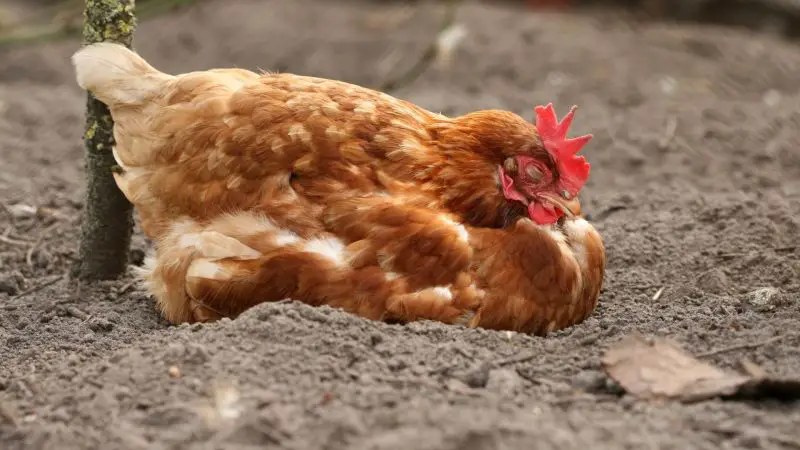
Sick chickens will be unable to lay eggs as the illness takes a heavy toll on their body. However, allowing your hen to rest and treating your hen with the proper medication will lead to quick recovery so your chicken can return to egg production.
A more common problem with chickens is infestation by pests, like lice or mites. When present in large numbers, these blood-sucking parasites can leave a chicken feeling weak and fragile. And in this weakened state, the hen will be unable to lay eggs.
To prevent infestation, inspect your hens regularly and ensure they are clean and parasite-free. Aside from direct egg issues, an infestation will leave your chicken stressed, making it more challenging for your hen to lay eggs.
8. Overbreeding of Chickens
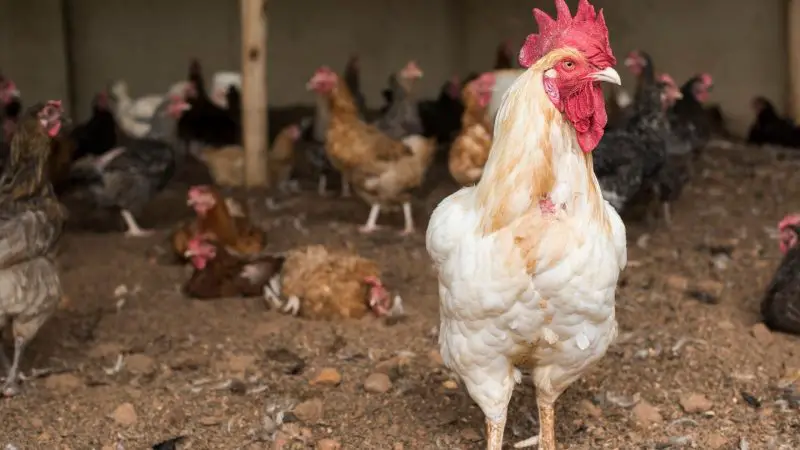
Some chicken farms keep roosters within their hen coops to ensure they get a fresh batch of chicks ready to lay eggs when they’re grown up.
The issue with having roosters in the same coop is that your rooster may be too eager to mate and want to mate all the time. Hens who are constantly harassed by roosters tend to get stressed out, avoid eating correctly and may even stop laying eggs.
Additionally, some roosters can be aggressive and injure your hens, making them less likely to feel calm and in a state where they can lay eggs.
If you’re looking to have new chicks, it’s best to set a schedule for your rooster so that your rooster doesn’t bother the hens to a point where they stop laying eggs.
You may leave your rooster in the chicken coop for a day or two every week, particularly during the breeding season. At other times, it’s best to separate your rooster from the flock so they can lay eggs in peace.
Summary
While there are some factors you can’t solve, like age, daylight, and molting cycles, you can improve egg production significantly by creating a comfortable environment and giving them the nutrition they deserve.
Related: How to Start a Chicken Egg Farm? | Tips and Guide
